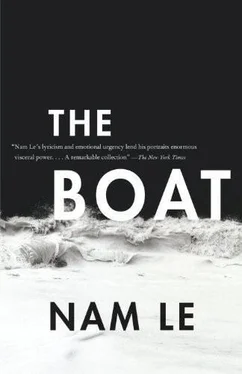Roya lifted her hand to her mouth. "She did not tell you?" She rested her chin in her palms — an awkwardly coquettish effort to frame her face. "I am her sister."
Sarah sat down and sipped her tea. She felt acutely unsettled. It was in keeping with Parvin to withhold details, but all this? — this sister from an erstwhile life? This baroque villa? What else hadn't her best friend told her?
"Are your parents here?"
"They are away because of the rally." On seeing Sarah's expression, Roya amended, "I mean, they are in Turkey for vacation. They give us the house for the rally."
The meeting began. Mahmoud spoke first and others — in particular Parvin — interjected. It soon became clear, as Roya confirmed during the course of her choppy, digressive translations, that they were again arguing about the play. Parvin wanted to stage the reenactment — in the square where the rally would be held-of the young girl's torture and execution. Mahmoud said it would be too dangerous. The square would be watched by religious militia. Such a reenactment would mock the official passion plays of the Battle of Karbala. Sarah tried to concentrate but she felt, as Roya jawed in her ear, the room, the crowd of strangers, their heated back-and-forth — everything — all receding from her as though she were in her mother's house again, watching the plants in front of the living room window curl into chalky remnants of themselves. Parvin was gesticulating. Sarah, watching, now felt a delicate tenderness toward her: she had, at least, acknowledged Sarah's heartbreak — if only to her sister. She'd said to her sister that Sarah was the one. Had she also told Roya that for the last three months — since Sarah had quit her job — she'd crawled back to her mother's house? Eating, not talking, blanking out and coming to with undirected terror? Awakening constantly as if from afternoon naps into darkness? Even now, those months seemed to Sarah a dim fantasy. Those honest, initially unbearable conversations she'd had with Parvin about Paul all seemed suspensions of lived memory. They'd talked like suitors, careful with one another, and in the end, when Parvin had extended the invitation, it hadn't been assurance or exhortation that had convinced Sarah to come to Tehran but the note of vulnerability she'd detected in Parvin's voice when she'd stated, simply, I want you to see what I've been doing .
Someone was saying her name. She blinked, focused on Mahmoud. He said in English, "Sarah, what do you think?"
Everyone watched her silently. She hauled her mind back to its present circumstance: the rally, the play. She sensed Parvin glowering in her direction.
She said, "Well, if it's dangerous — "
Mahmoud's mouth twisted up at one corner.
Parvin broke in, "What does she know? She's only been here half a day."
"And how long have you been here?"
"Mahmoud," said one of the women.
"No," he declared, "was she here in 1999? When we went out on the streets and — and Hassan and Ramyar and Ava were taken? And she" — pointing to Parvin — "was in her radio station in America, telling us to go out on the streets?"
Parvin said, "I didn't have a show in 1999."
"Last June," muttered a young dark-haired woman.
"I'm as politically committed as anyone here."
"She was not here in 1999," said Mahmoud, "and she was not here last June."
Parvin turned directly toward him. "I'm here now," she retorted, but her voice inflected upward, as if unsure whether or not it was asking a question.
"And now, for her, we should defame our religion? When she understands nothing of it?"
"Forgive him," said Roya. She looked sideways at Sarah.
"Why did you come?" a man's voice demanded.
For a moment no one spoke, then Sarah realized, all at once, that he was speaking to her. She broke off a piece of bread and dipped it in yoghurt. It would be folly, she knew, to engage someone in such an aggressive frame of mind.
Parvin turned toward Sarah. Her face had an odd, hollowed-out look to it. She said, "She came to visit me."
Mahmoud held up two fingers in a dogmatic manner, his head and neck gone rigid. He started intoning in Farsi.
"The imam comes to Karbala with fewer than one hundred men," translated Roya, her tone official, impersonal, "to sacrifice himself to the army of Yazid."
Mahmoud floated his gaze over to Sarah.
"He is-how do you say it? — beheaded. He dies — for who? For mothers and for daughters. And now we are to spit at his face?" Parvin, seething, replied in a low voice, in Farsi.
"He does not die for the little girl," said Roya.
Mahmoud spoke again. Roya said, "This week is to mourn the imam."
She waited for Parvin to finish speaking, then said, "Who will mourn the little girl?"
Then, once Mahmoud had spoken, she lifted her hand and flicked her fingers, unconsciously mimicking him, and said, "One has nothing to do with the other."
***
Roya led her to an upstairs study that smelled strongly of wood lacquer. The window had wooden shutters and, behind those, thick milk-colored drapes. A small writing desk fronted the view. A single bed against the wall. Roya went in and shuttled the curtains to either side, letting the sunlight strafe in.
"There is a bath," she said. For a moment Sarah was confused. Then Roya opened a semi-concealed, recessed door and showed Sarah into a bathroom as large as its adjoining room. The toilet, Sarah noticed, was Persian-style — a porcelain-lined hole with a hose adjacent. Through the walls Sarah heard the distinct sound of a BBC broadcast.
"You have satellite?" she asked.
Roya smiled at her almost maternally. Then she crossed her arms over the Chinese character on her chest and rocked back on her heels. Her face became pinched and brisk.
"Parvin says you come for the rally."
"Yes," Sarah said carefully.
She emitted a dry chuckle. "Parvin is excited about these things. Very easily. Always. Like the play."
The scene downstairs came back to mind. "Does that happen a lot?" Sarah asked. "Parvin and Mahmoud, I mean."
"Yes," said Roya, then, "No, not like that."
An impulse stirred within Sarah. "What do you think about the play?" When Roya didn't reply, she quickly pressed on: "You must be very happy to have Parvin back."
But Roya was thinking about something else. Finally she said, "Mahmoud does not talk about it." She stood, arms crossed, absolutely still. "In 1999 his brother was shot. In the square where the rally will be."
Sarah exhaled.
"And then his father, who is an important cleric here — how do you say it? — denied him. As his son. In the mosque."
At that, Roya pushed past Sarah back into the study, then hesitated by the desk. Her stance was guarded now, as though waiting to be dismissed. "Parvin likes it in America, yes?" She pronounced it Amrika . Without waiting for an answer, she said, "Parvin wanted to go, always, as a child." She leaned forward. Sarah realized she was being confidential. "I could have gone too, you know."
Late afternoon light streaked in, contoured Roya's face in sharp, ambiguous planes. All at once Sarah comprehended the woman in front of her. She was the one who'd stayed behind. She'd stayed, toiling the same unspoken trench of sacrifice so that her sister could escape.
"The play," said Roya, "it seems like punishment." She lingered on the word. "But who is it punishing?"
"Is it too late?" asked Sarah. "For you to leave?"
Roya stared at her for a moment, then her face dissolved into a slippery mess that had a smile in it. "I think about it," she said. "But why would I leave now?" She giggled into her fingers. "This is the most exciting time. If I leave now, what if I miss something?"
* * *
WHEN PARVIN WAS FOURTEEN, her family had long been marked as subversives by the revolutionary committees. Although they were religious-and had originally supported the revolution-her parents had been forced into hiding and her two older brothers into the front lines of the war.
Читать дальше











